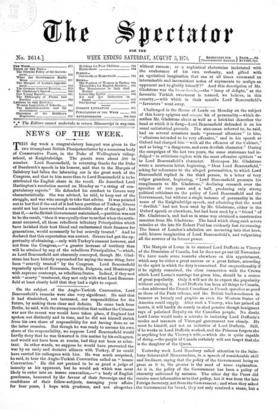Yesterday week Lord Rosebery called attention to the Sails- bury-Schouvaloff
Memorandum, in a speech of considerable skill and liveliness, saying that the policy of the Government being so great as it is, the greater is the need of some explanation. As it is, the policy of the Government has been a policy of obscurity enlivened by sarcasm. The other day the Peers did receive some information as to that policy, but it was from the late Foreign Secretary, not from the Government ; and when they asked the Government for bread, they not only received a stone, but a stone thrown at them with considerable vigour. Nothing could induce the Government even to give them the exact text of the Salisbury-Schouvaloff Agreement, though Lord Salisbury had denied altogether the trustworthiness of the first summary published, and the other Ministers had afterwards carefully agreed upon the words in which, in both Houses, the de- fects of the full version, when it appeared, were described. Lord Rosebery commented also on that curious passage in the despatch to Lord Odo Russell, which assumed that the Government was still free to decide as it should think fit concerning matters upon which its decision was already pledged by Lord Salisbury's own agreement with Count Schouvaloff. He said it was like nothing so much as the conversation between " Starveling " and " Bottom " in Mid- summer Night's Dream, where Starveling suggests that, after all, the killing must be left out, and Bottom replies, "Not a whit, not a whit," but that a prologue shall be written to seem to say, "We will do no harm with our swords, and that Pyramus is not killed indeed, and for the more better assurance, tell them that I, Pyramus, am not Pyramus, but Bottom the weaver. This will put them out of fear."































